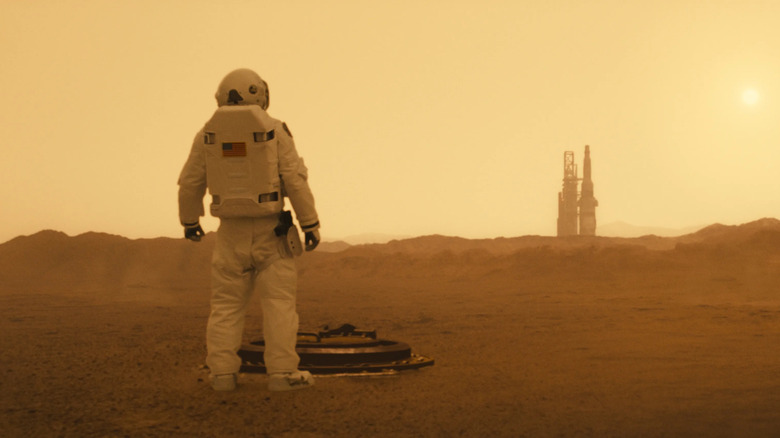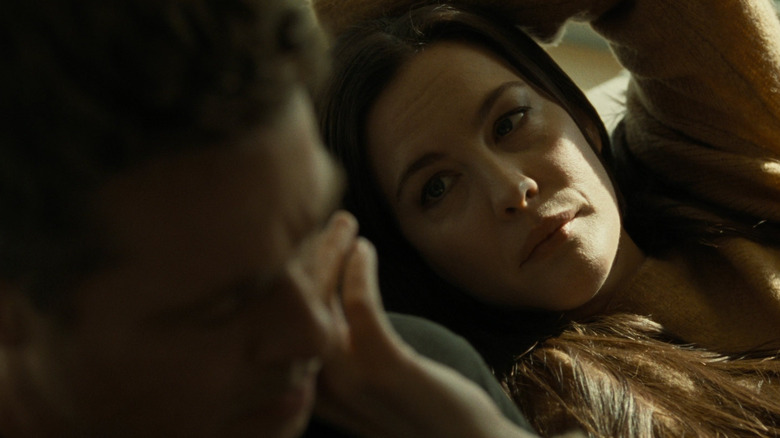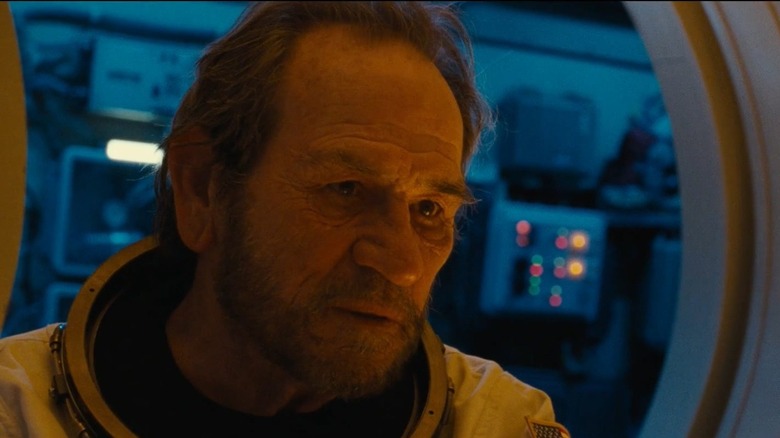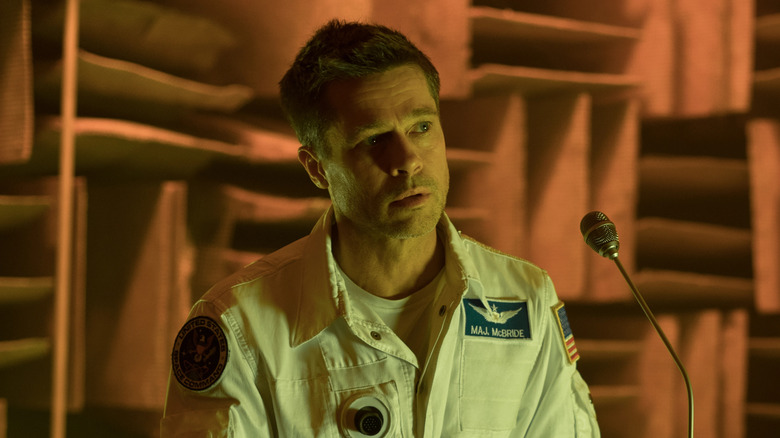What James Gray Intended For Ad Astra And Why Brad Pitt Was Perfect
As director James Gray intended, the 2019 film "Ad Astra" is deeply contemplative and melancholic. Your mileage may vary on how appealing that sounds, but to its credit, the movie does have a lot on its mind. Through an allegory centered around fatherhood and searching for life in the universe, the movie wrestles with themes of isolation, loneliness, and masculinity — all of which called for a lead actor that could represent a specific walk of life. With Brad Pitt's character, Major Roy McBride, Gray said in a 2019 interview with GQ that he:
"...wanted almost to conjure a kind of '60s idea of an astronaut ... I had wanted to make something that was sort of the last dying dance, in a way, of an older world order. And to show in some sense how rotted it is."
In this respect, Gray's "Ad Astra" enters a pantheon of films like "First Man" and "Interstellar" and, more recently, TV shows like "For All Mankind" and "Away," which probe the real struggles and internality of being an astronaut. All of these shows attempt to portray astronauts not as flawless human beings, but as Gray sought to portray Roy McBride, who "outwardly you think has it all together but in fact is really battling inner demons." Having known each other for nearly 25 years, since Pitt reached out in 1995 to discuss Gray's film "Little Odessa," Gray understood Pitt had exactly the personal background necessary for the role.
Being a dad
Like real life astronauts, Brad Pitt — as a father of six — (and notably, James Gray, who has three children) has dealt with balancing career and family. While anyone who takes on a space mission is inevitably leaving a loved one behind, some astronauts have commented publicly on the specific challenges of being a parent in their job. NASA astronaut Nick Hague, for example, said in an interview with NBC Today, "A lot of the parenting — there is no way around it — it is going to fall on the shoulders of the spouse at home."
Themes tied to parenthood are spread throughout "Ad Astra." Roy McBride is a husband to Eve (Liv Tyler) and dad, along with having a strained relationship with his own father, H. Clifford McBride (Tommy Lee Jones), who always chose his work over his family. Brad Pitt brings an appropriate background to the role not only because he has children himself, but also because he has experience making difficult choices between his career and his family. In the same 2019 interview with Gray, Pitt explained to GQ that he was becoming increasingly picky about roles and said:
"Who you spend your time with, how you spend time — it has just become much more important to me."
At 50 years old, Gray also intended for "Ad Astra" to explore themes of getting older, and as a 55-year-old man during the making of the movie, Brad Pitt objectively fit the demographic that Gray wanted for his lead actor. Aging was on Pitt's mind at the time as well. When he considered why he was becoming more selective about his roles, he told GQ:
"Maybe it's just getting older too, man ... How you become more aware of time."
A lonely man
"Ad Astra" is principally a story about feeling isolated and alone — another phenomenon that real life astronauts need to navigate due to the clinical effects of space travel. As Gray describes the meaning of his film:
"It's about trying to find a way to express something about loneliness. To get at something that we both understood and sometimes couldn't even verbalize."
This is clear in the narrative, which culminates in the reveal that humanity's best attempt to find life on other planets has come up short, suggesting we are alone in our galaxy and possibly the universe. For some, including Roy's father, who find comfort in believing that other conscious beings are out there, the realization that life on Earth is one of a kind would be truly devastating. For others, as Roy McBride comes to learn, this discovery would only emphasize the importance of humanity and the people who we love.
Right for the role
From Gray's perspective, Brad Pitt was the perfect actor to embody these themes. In contrast to Quentin Tarantino who has said he views Pitt as "a movie star, a guy who can hold a shot, or a throwaway line of dialogue, and make it feel sexy and immortal — instant film history," Gray saw something else:
"I felt that Brad had always had that kind of — I don't want to say anger, because anger has negative connotations — but danger in him, you know? And that kind of loneliness, which comes with the territory of who he is. And you use that."
For Pitt, this aspect of his personality comes from his upbringing in the Ozarks, where he said, "We're people who get things done. Don't talk about much; get it done." Pitt ultimately found the habit of never discussing or dealing with his inner life to have a negative impact on himself and began to make adjustments, but he remains familiar with the consequences of keeping thoughts and emotions to oneself. Fame, which Pitt has compared to "being hunted," has also familiarized the actor with the effects of loneliness.
The fact that his company, Plan B Entertainment, produced "Ad Astra" was evidently not the only reason he was drawn to the lead role. Pitt has said, "It's been my question the last 15 years: If I'm gonna do the role, what can I bring to it that someone else can't." In "Ad Astra," he certainly found what he was looking for with a part that connected with him on a deeply personal level and allowed him to convey universal truths about being an astronaut, a father, and a human being.



